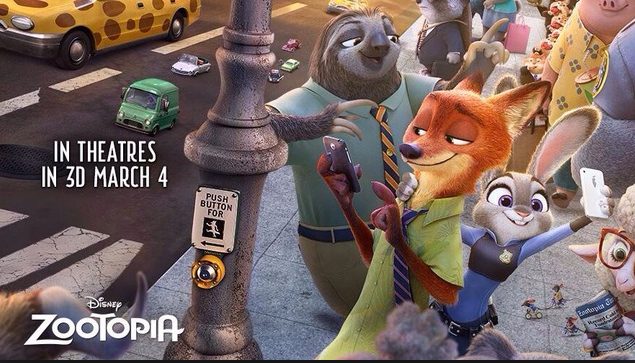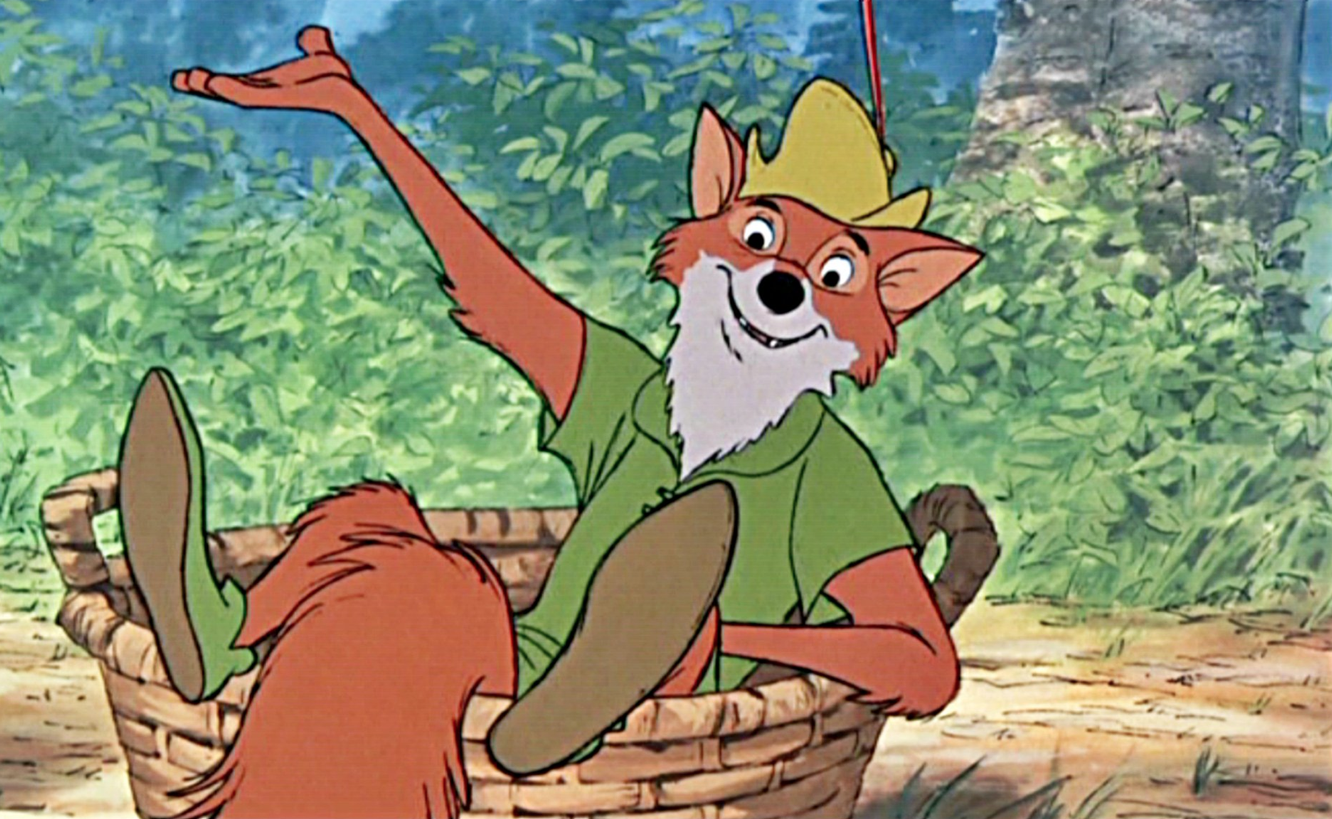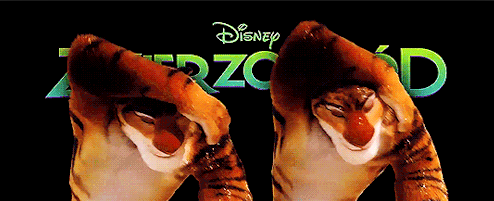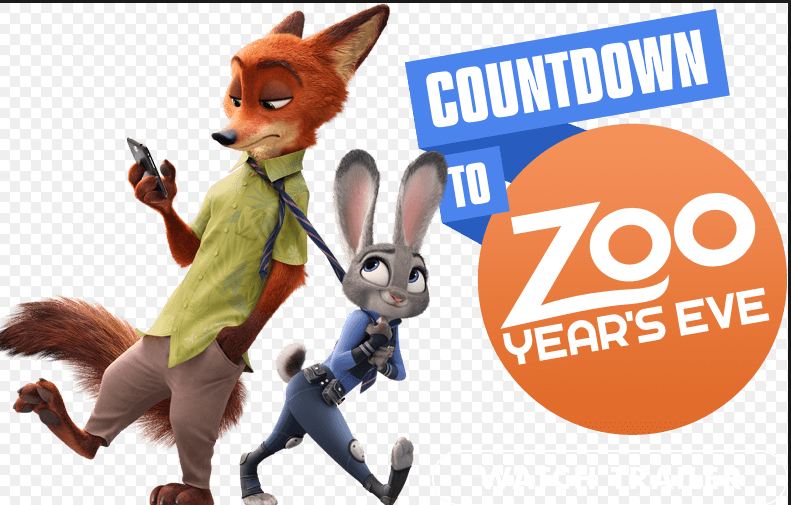Based on the leaded trailers and, let’s face it, troubling buddy-cop framing, I expected to bitterly groan my way trough Zootopia, Disney’s new CGI bauble which is on its way to box office records for the studio in its opening weekend. For me, the glaring sting in this movie purported to teach kids about racial bias and the idea that anyone can be whatever you want to be (a novel concept for a Disney film!) is that a picked-on girl’s greatest dream is to be a police officer. In the lead-up to the film’s release, I’ve brooded over a melange of discomfort and disgust at a theme so poorly timed when more and more attention is being paid to the tensions between minority communities and law enforcement. I feel like Indiana Jones in Raiders of the Lost Ark. “Cops… Why’d it have to be cops?” It’s the Achilles’ heel to a film I largely found delightful. However, in those moments of doubt, I had of course set aside the fact that a) I am a furry pervert. b) this movie stars a plucky bunny lady. c) BUNNY. BUNNY BUNNY BUNNY.
I’ve written before about how using furries as an analog for racial strife can be a very bad idea, specifically dealing with the disaster that is Blacksad: Arctic Nation. (TW: cartoon depictions of racist violence/lynching) It can be just too crude a cudgel with which to bash your message into the lobes of your intended audience, and animal stand-ins often substitute for racist caricatures in an ostensibly anti-racist work. The dynamic between the lead characters, and the sociology of a furry metropolis could have fit into many kinds of stories. Instead we have a message that tensions in a multicultural society are solved by policing. That by the end of con-man Nick’s (Jason Bateman) arc is that he joins the civic-minded, selfless Judy on the force, as that is the natural end-point of those good personality traits. I’m sorely disappointed with that particular angle. I agree largely with furries like twitter friend Eva Problems whose critiques the movie on the grounds that the political element can’t be decontextualized provide some much-needed clarity.
The social organization of the furry universe of Zootopia serves individual character interactions with less clumsiness than the broad “message” of the film. The film actually benefits from a lack of commitment to a coherent racial analogy like the depiction of white fur in Arctic Nation that mimics whiteness as a social construct. The hazy coexistence of predator/prey gives us an environment where contradictory characters can experience marginalization and empowerment in a variety of contexts. The tension between predator and prey abruptly upends itself three-quarters way through the movie, where the point of view switches somewhat from Judy’s to Nick’s and we are given new perspectives from which the characters can feel discounted, othered and feared. It’s bewilderingly self-aware and at the same time is so not. For instance the police department that Judy is assigned to is largely staffed by predator species. This makes sense in the first act when they bully and discount Judy’s ability, but doesn’t carry over to the 2nd when predators are the targets of fear and suspicion. The take-away of the film is clearly meant to instill empathy, compassion, anti-racism and multiculturalism in its intended audience of young viewers. The real concern regarding a critical reading of Zootopia’s themes is whether this movie will inspire more curiosity in young folks about bias, bigotry and corruption or pacify that curiosity instead in a pat, simplified entertainment product that upholds the status quo.
In Zootopia, Judy Hopps is our hero, voiced by Jennifer Goodwin. Judy is a punk and Judy is a runt. A child in a litter of two hundred or so kittens of content Rabbit carrot farmers in a rural community, she is driven to be extraordinary, to explore and to serve the greater good. That her vision of service involves the career of law enforcement… well I’ve already registered my reservations. Judy is personally ambitious and driven to protect others, except maybe when made to doubt her competence as an authority figure. Her chief, the hulking Cape Buffalo (Idris Elba), accepts her assignment as a publicity measure but was never interested in employing his city’s “first rabbit officer.” He wants Judy out of there as soon as the good press blows over, assigning her to parking duty in an attempt to humiliate her off the force. Stung, Judy sticks it to the chief by being the best meter maid she can be, employing a predatory practice that often disproportionately affects the poor. She knows how to stick up for herself when a (juuuuuuust right) sized citizen wants to pick on her (which is all the time) and also misjudges the good nature of bigger people who accept her presence as a matter of political convenience rather than actual tolerance. She busted her ass to ace exams she was disadvantaged for only to matriculate into a police department made up of brutes and bruisers who, predator and prey, male and female, are evaluated on a scale of physical characteristics that only acknowledge the big and physically imposing. She battles against the idea that bunnies are too meek for serious work, that gentle-hearted people are too feeble for serious service. It’s clear she’s every bit as capable at her job as much for her wits, tenacity and compassion as any big bad wolf.
She takes an opportunity to butt her way into a real case when over a dozen citizens, all predators, go missing. What’s more, they’ve all been struck by a rapid degenerative position that renders them violent and in basically a “feral” state. After being burned by him, she conscripts the petty grifter Nick Wilde, a sly-but-not-as-sly-as-he-thinks-he-is fox into her scheme to keep her job by him helping out in the missing-person investigation. Nick takes every opportunity to gleefully undermine her ecumenical dream of moving to the big city and changing the world, so Judy blackmails him into helping her, in part because she needs his streetwise knowledge of her new city, and also to test her insecurities. She wants to battle the social prejudices that belittle her, but can she overcome deep-seated ones of her own about foxes? Her moment of clarity was after being violently bullied by a fox as a child who told her, dumb bunnies can’t amount to anything. Hopps’ overcautious Midwestern parents reinforce this. So Judy goes for broke and moves to to a miserable little boarding house in the big city, not necessarily to spite them, but to prove them all wrong in any case.
Nick is Judy’s natural foil, a totally self-interested, cynical crook whose dreams got crushed early by his childhood tormentors (all herbivores), replayed in a devastating flashback (good thing I saw it at a nearly empty matinee, as a lone adult crying seated next to a strangers’ kids is not a great look). He nags her with poisonous barbs because, well naturally he doesn’t like cops, and her cloying earnestness eats away at something inside of him. They share a back-and-forth that reads like the first act of a horseshit romantic comedy, bitterness and acrimony as a silty overcoat to a significant bond. The value that comes out in the wash though, is the damage, and the shared desire to heal that damage that brings them together, and breaks them apart, and brings them together again. The emotional core of this movie, the reason that it works, is these two people who are so fundamentally opposed in every way who grow to depend and care for each other. Maybe you could read their relationship as a romantic one, but it’s not necessary for appreciating the bond they share. It’s a buddy cop movie, and Nick and Judy are magnetic buddies.
The Zootopia-inspired site banner for Furaffinity, the internet’s largest furry social media/art gallery site. By Korichi.
So again, the race allegory keeps weaving itself through every relationship, interpersonal and social. Judy is transferred to the heart of the city by calculating bureaucrats seeking to appeal to a %90 herbivorous population who nevertheless entrust their policing to a minority of mostly predator species. The predators are the natural leaders and protectors, and yet feared and ultimately despised and marginalized for their supposedly “biological” predilections toward violence. The mayor is the lion and his deputy, the lamb (well, sheep). Judy in the world of Zootopia occupies at the same time the position of being victim and victimizer. She’s someone counted out by her native community and her chosen community. But Judy finds herself wielding tremendous social power against a populace that is seen as highly influential and yet looked upon with suspicion. Criminality is shown as a trait of in predatory species, just as as political corruption is in prey species that secretly manipulate the supposedly homogeneous society of Zootopia. The explicitly stated point is that forming a multicultural society is messy, and yet each individual is responsible for dealing with their own ingrained biases when interacting with people with a (naturally) different perspective. Judy and Nick are not fast friends. But they share a common experience in being singled out. There are large herbivores on the police force, but there’s never been a BUNNY cop. Carnivores are largely integrated into society, but everyone agrees you can’t trust those nasty FOXES.
Hi Daddy
There has been non-stop chatter in the community in the lead-up to this weekend about the extent to which Zootopia is a “Furry” movie. How many of us walked among the aminators, directors and writers who brought us this fantasy. Would Zootopia, like its antecedent, Disney’s Robin Hood be a secret key to the hearts of people who pretend to be cartoon animals in order to really feel human? Young folks love cartoon animals, sure, but will this film mark another Cambrian explosion of lifers like well, me? Supposedly, the image Byron Howard, Zootia’s director along with Rich Moore, used to pitch the concept of a return to funny animal movies to executive producer John Lasseter was of Disney’s foxy loxy Robin Hood reclining in a wicker basket. The not-insignificant marketing campaign behind the movie might have included a branch directly reaching out to furries. I’ve noticed a rush to claim ownership over a well-anticipated property. I share in a relief at its positive response that wouldn’t have necessarily happened maybe just five years ago. Nowadays who even are you if you don’t have a fursona?
I’m somewhat of a camp that understands Furry culture as inextricable from sexuality. So I’m hesitant to speculate on the upcoming generation of furries who have a right to figure their own shit out in their own time. Furries have already proliferated a king-of-the-jungle’s ransom of Zootopia inspired fan porn (sometimes obnoxiously using official hashtags. I do wish people would cut that gunk out.) If you know where to look, it’s unavoidable that Zootopia is a fueled in part by the horny of furry animators and storytellers from roughly my generation. There’s the scene where Judy, though small in stature compared to many creatures, got to be a relative giantess, stomping around the neighborhood populated by tiny mice and shrews. While not an exclusive attribute, the Macro/Micro fetish focusing on extreme size difference is a conspicuous facet of furry culture. It’s a spectacularly composed chase scene for those not in the know, and a pretty big “OOOOOOH” moment for the kink-literate. During the climax, Nick (with negotiated consent) “went feral” and play acted a scene that culminating in him sensually biting Judy’s neck. This doesn’t necessarily subvert my non-rom-com interpretation of the leads’ relationship, I’m of the school of friends boning down sans-strings being a thing that can happen. But in any case, this is a crucial, fraught, terrifying intimate moment. And Nick’s definitely a type of guy who’s down to get pegged. Oh. By the way. Did you notice, watching the end credits…………… THOSE TIIIIIIIIIIIGERS? MY GOD. Zootopia highlights a lead who is not a princess, and not really romantically driven. But it’s also the horniest movie Disney has ever made. I’m talking almost Don Bluth-level barely sublimated horny.
EXCUSE ME???!
Zootopia is a PRETTY movie, no… a goregeous movie, with jaw-dropping attention to detail in background animation and dedicated research based on the real animals the cartoonized characters are based on. Every figure, major and minor, is cartooned with an exaggerated take on their native animal’s shape, weight and movement. Their responses to high-stress situations, like ducking an obstacle on the roof of an out-of-control subway car, is informed by the meticulously observed behavior of the actual animals being represented. The environments they move through, the city center or the tundra or, my lord, the jungle zone, are spectacles, lovingly rendered in frequent wide establishing shots. The fur (THE FURR) of each chraracter is so tactile, from the fluffy cheeks of a sedentary cheetah to the greasy, nappy locks of a naturist gnu (voiced by Tommy Chong!). To the art department, only love and kisses and more money for you.
Zootopia’s message is mired in role reversals, or dualistic prejudices cast into flux. The twist ending, the reveal of the mastermind behind the purposeful stoking of tensions between species is hysterical in one sense and deflating in another. There is a constant, conscious focus on hard realities in this breezy fuzzy fable for kids. People sometimes act on unexamined biases or are motivated to do terrible things by an unaddressed but real sense of grievance. Zootopia glosses over issues of police departments’ responsibilities to the communities they serve, but also highlights its main characters empathy and selflessness as her personal and professional strength. It mind-blowingly (though abstractly) references the panic about crack cocaine in urban communities in the 80s and 90s and how it was cynically used as a wedge to stoke racist paranoia. And yet the film presents a fantasy where the government parties who stoke the fires of fear and division are punished for their corruption and the victims are given treatment. The city focuses on a theraputic, non-carceral solution to the chemical that turned the unlucky predators to violence, and they return to their families.
This court has concluded that there is no statute on record that explicitly forbids parties Wilde and Hopps from kissing.
Zootopia is one hell of a slimy gumbo of contradictory messages. But I’m from Alabama, and I like gumbo. The inherent pun in the title, in the United States release at least, is that the messy, resentful furry metropolis that Judy vows to serve and protect is not anything like a Utopia. It’s multi-culture sheen is driven by barely restrained resentment and contempt. People like Judy Hopps can in good conscience think they’re doing the right thing while letting their biases stoke sub-dermal bigotry between predator and prey. And in the pursuit of her own dreams, she realizes that she’s the convenient tool of predatory bureaucrats covering their own asses until the next election cycle. In this miasma of cynicism, the corniest of Disney cliches kind of… blossom. When Judy believes in herself, and cares about others, and trusts someone who isn’t anxious to give her a reason to, she saves the day. Fatally flawed as it is, Zootopia is one paw forward into our furry future.
ALSO LOOK AT THE BUNNY.





